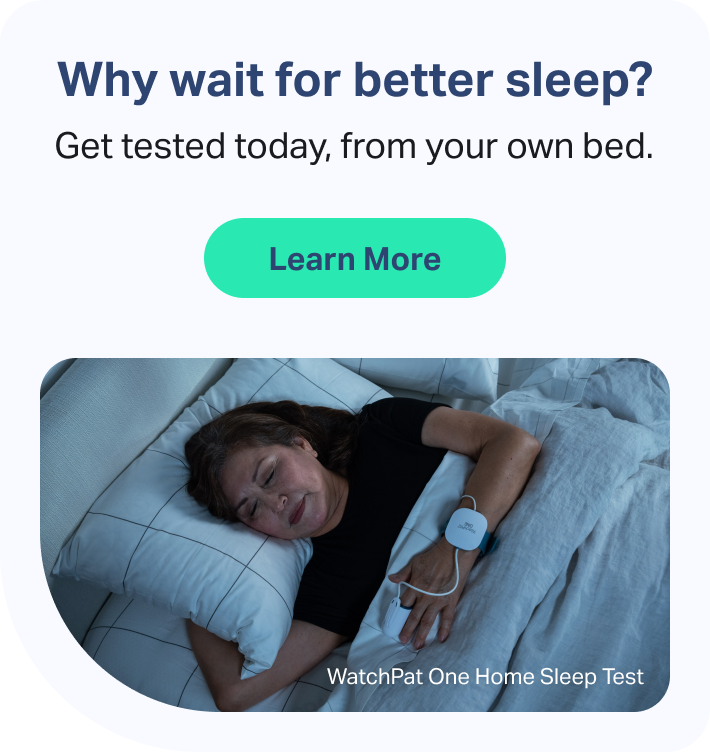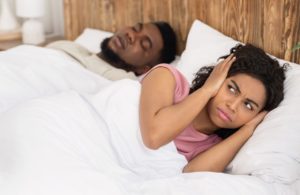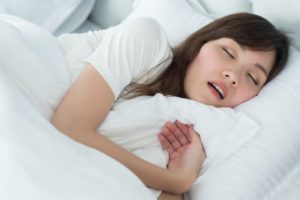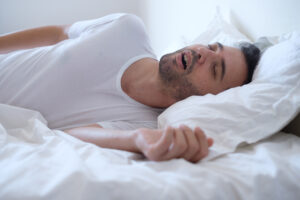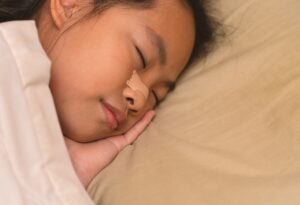When you buy through our links, we may earn a commission. Products or services may be offered by an affiliated entity. Learn more.
Mouth Taping for Sleep: Does it Work?
- Mouth taping is a popular trend where a person tapes their mouth closed before sleep to encourage breathing out of the nose.
- People may tape their mouths before bed to stop snoring or to reduce bad breath.
- The benefits of mouth taping for sleep are mostly anecdotal, since only a few studies have analyzed this trend.
- Side effects of mouth taping include difficulty breathing, skin irritation, and anxiety.
Mouth taping is an increasingly popular home treatment used to encourage nose breathing during sleep. People who tape their mouths closed at night may do so to address issues ranging from snoring to bad breath.
Mouth taping for sleep has only been studied in a couple of small scientific experiments, so its purported benefits are largely anecdotal at this point. We discuss how mouth taping works, what existing research tells us about the practice, how to tape your mouth safely, and what alternative options exist to treat your sleep-related issues.
What Is Mouth Taping?
Mouth taping refers to the practice of taping your mouth closed at night before you fall asleep. People may try mouth taping because they believe that by forcing themselves to breathe through the nose, they can avoid negative effects associated with mouth breathing.
How Does Mouth Taping Work?
Mouth taping involves taking porous tape and affixing it over both the upper and lower lips, so a person cannot easily open their mouth. Taping the mouth shut before bedtime prompts a person to breathe through their nose while they sleep.
Does Mouth Taping Help With Snoring?
Mouth taping might be beneficial as a snoring treatment. In a study of people with mild obstructive sleep apnea , wearing a porous patch over the mouth caused all the participants to breathe through their nose, and it changed the angle of the palate and the tongue. These changes led to significantly less snoring and fewer instances of lapsed breathing.
Researchers have not yet examined if or how mouth taping impacts snoring in people who do not have obstructive sleep apnea. As a result, more research is needed to say with certainty whether mouth taping can effectively treat snoring due to other causes.
Benefits of Mouth Taping
Anecdotally, people claim mouth taping eases a variety of problems, such as snoring, fatigue, concentration issues, bad breath, and excessive thirst at night. Most of these claims have not been scientifically studied. So far, research has only demonstrated one benefit of mouth taping: a reduction in snoring and tiredness in people with obstructive sleep apnea.
Despite the fact that nose breathing filters out allergens, adds resistance that benefits lung volume, and delivers warmer, more humid air to the lungs, studies on mouth taping for people with asthma have found no benefits. Nevertheless, proponents of mouth taping claim it may help reduce the negative effects thought to be associated with mouth breathing, including:
- Attention deficit hyperactivity disorder (ADHD) symptoms
- Sleep-disordered breathing
- Dry mouth
- Cavities
- Gum disease
- Bad breath
- Slowed growth in children
- Decreased cognitive ability
Further research on nighttime mouth taping and each of these issues is required before it can be credibly claimed that mouth taping effectively treats them.
Side Effects of Mouth Taping
Side effects of mouth taping have not yet been fully studied, but anecdotally reported side effects include:
- Irritation on or around the lips
- Pain when ripping off the tape, especially for those with facial hair
- Disrupted sleep due to irritation from the tape or difficulty breathing through the nose
- Anxiety, for those who feel uncomfortable having their mouth taped shut
- Discomfort or difficulty breathing
Future research could uncover additional potential side effects related to mouth taping.
What Kind of Tape to Use for Sleep
If you decide to try mouth taping, use a porous tape intended for use on human skin. Trying duct tape, masking tape, or another tape not intended for use on the body might be more likely to cause irritation or an allergic reaction.
Some companies sell adhesive strips designed to be used for mouth taping during sleep. Most pharmacies also sell hypoallergenic tape, surgical tape, and athletic tape, which are porous and commonly used on human skin. The vast majority of people are not allergic to medically used adhesive tapes , though some may experience irritation or other reactions to medical tape.
How to Mouth Tape Safely
Since mouth taping is not considered a commonly accepted practice, speak to your doctor before trying it. Currently, there are no official guidelines outlining how to mouth tape safely. Also, the risks that come with mouth taping without a doctor’s advice are unknown.
Before trying mouth taping for sleep, it is a good idea to test the mouth strips during the day. If you have difficulty breathing through your nose due to allergies, nasal polyps, or another reason, you should avoid mouth taping.
You can minimize irritation and leftover stickiness by applying a food-safe gel or oil to the area around your mouth before sticking on the tape. When putting on the tape, consider folding it over at one corner for easier removal in the morning.
Alternatives to Mouth Taping
Alternatives to mouth taping vary depending on why you are interested in mouth taping.
Side Sleeping
If you want to reduce snoring, you might consider training yourself to sleep on your side instead of taping your mouth. Decades of research demonstrate that both people with and without obstructive sleep apnea snore less when they side sleep instead of back sleep.
To make switching sleep positions more comfortable, you may want to consider purchasing a new mattress and pillow. The ideal bed setup promotes spinal alignment and reduces pressure points as you lie in your most common sleep position.
Nasal Strips
Nasal strips provide another option for snoring reduction. Nasal strips are adhesive devices placed on the nose to expand the nasal passage and encourage nose breathing. Studies of nasal strips have produced mixed results, with some showing an improvement in snoring and some showing no effect.
Treating Allergies and Asthma
Around 25% of people in westernized countries experience an allergic reaction to substances they breathe in, such as pollen. This reaction often involves nasal congestion, which can make breathing through the nose more difficult. If you have allergies and find yourself mouth breathing at night, try treating your allergies to see if that helps you breathe more comfortably through the nose.
Similarly, people who live with asthma should work with a doctor to control symptoms by avoiding triggers and using medication where appropriate.
Practicing Good Oral Hygiene
Mouth taping interests some people because of promises that it can cure bad breath. An oral hygiene routine that includes regular tooth brushing, flossing, tongue cleaning, and gargling with mouthwash can also help protect against bad breath .
Practicing Good Sleep Hygiene
Some people claim mouth taping reduces daytime tiredness. There are multiple other sleep hygiene habits that can help you obtain the sleep you need, such as:
- Going to sleep and waking up at the same time each day
- Sleeping in a room that is free from light and noise
- Avoiding looking at screens before sleep
- Skipping alcohol and caffeine in the hours before bed
- Exercising regularly
When to Talk to Your Doctor
In some instances, people interested in mouth taping might benefit from seeking medical help instead. Consider making an appointment with your primary care physician if you:
- Have a sleep disorder or think you might have a sleep disorder
- Experience severely bad breath
- Have a child that breathes primarily through their mouth
Sleep disorders are conditions that require professional diagnosis and treatment rather than home remedies. Trying mouth taping instead of visiting your doctor could delay the start of important treatment.
Similarly, extreme bad breath could be due to an issue other than mouth breathing. For example, people can experience severe bad breath as a result of cavities, underlying sinus infections, and digestive problems like ulcers. Visits to your doctor and dentist can help you identify and treat potential underlying medical or dental issues.
It is also important to see your doctor if your child has an issue with mouth breathing. Mouth breathing may slow growth in children, so it may require medical attention. Mouth taping in children has not been studied and should not be tried.
References
13 Sources
-
Cooper, S., Oborne, J., Harrison, T., & Tattersfield, A. (2009). Effect of mouth taping at night on asthma control—A randomised single-blind crossover study. Respiratory Medicine, 103(6), 813–819.
https://pubmed.ncbi.nlm.nih.gov/19285849/ -
Sano, M., Sano, S., Oka, N., Yoshino, K., & Kato, T. (2013). Increased oxygen load in the prefrontal cortex from mouth breathing: A vector-based near-infrared spectroscopy study. Neuroreport, 24(17), 935–940.
https://pubmed.ncbi.nlm.nih.gov/24169579/ -
Huang, T.-W., & Young, T.-H. (2015). Novel porous oral patches for patients with mild obstructive sleep apnea and mouth breathing: A pilot study. Otolaryngology Head and Neck Surgery: Official Journal of the American Academy of Otolaryngology-Head and Neck Surgery, 152(2), 369–373.
https://pubmed.ncbi.nlm.nih.gov/25450408/ -
Morais-Almeida, M., Wandalsen, G. F., & Solé, D. (2019). Growth and mouth breathers. Journal of Pediatrics = Jornal de Pediatria (Brazil), 95 Suppl 1, 66–71.
https://pubmed.ncbi.nlm.nih.gov/30611649/ -
Jung, J.-Y., & Kang, C.-K. (2021). Investigation on the effect of oral breathing on cognitive activity using functional brain imaging. Healthcare (Basel, Switzerland), 9(6), 645.
https://pubmed.ncbi.nlm.nih.gov/34072444/ -
Smith, S. M., & Zirwas, M. J. (2015). Nonallergic reactions to medical tapes. Dermatitis: Contact, Atopic, Occupational, Drug, 26(1), 38–43.
https://pubmed.ncbi.nlm.nih.gov/25581669/ -
Ravesloot, M. J., van Maanen, J. P., Dun, L., & de Vries, N. (2013). The undervalued potential of positional therapy in position-dependent snoring and obstructive sleep apnea: A review of the literature. Sleep & breathing, 17(1), 39–49.
https://pubmed.ncbi.nlm.nih.gov/22441662/ -
Noss, M. J., Ciesla, R., & Shanga, G. (2019). Sleep quality and congestion with Breathe Right nasal strips: Two randomized controlled trials. Advances in Therapy, 36(8), 1975–1985.
https://pubmed.ncbi.nlm.nih.gov/31209698/ -
Eifan, A. O., & Durham, S. R. (2016). Pathogenesis of rhinitis. Clinical and Experimental Allergy: Journal of the British Society for Allergy and Clinical Immunology, 46(9), 1139–1151.
https://pubmed.ncbi.nlm.nih.gov/27434218/ -
A.D.A.M. Medical Encyclopedia. (2021, June 3). Asthma. MedlinePlus., Retrieved August 17, 2021, from
https://medlineplus.gov/ency/article/000141.htm -
Bicak, D. A. (2018). A current approach to halitosis and oral malodor—A mini review. The Open Dentistry Journal, 12, 322–330.
https://pubmed.ncbi.nlm.nih.gov/29760825/ -
National Center for Chronic Disease Prevention and Health Promotion, Division of Population Health. (2016, July 15). Tips for better sleep. Centers for Disease Control and Prevention., Retrieved August 17, 2021, from
https://www.cdc.gov/sleep/about_sleep/sleep_hygiene.html -
Tungare, S., Zafar, N., & Paranjpe, A. G. (2021). Halitosis. In StatPearls. StatPearls Publishing.
https://pubmed.ncbi.nlm.nih.gov/30521280/



